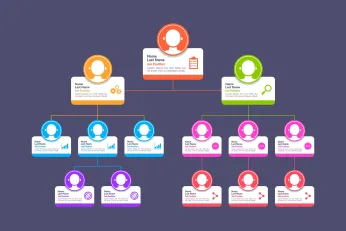Suruhanjaya Ejen Insurans: Apakah Itu dan Bagaimana Ia Berfungsi?
Ketahui cara ejen insurans memperoleh pendapatan melalui komisen, bonus dan pembaharuan. Fahami kadar komisen ejen insurans dan faktor yang mempengaruhi pendapatan mereka.
Pada halaman ini
Menguruskan komisen ejen insurans melangkaui hanya mengira pembayaran—ia mengenai mewujudkan sistem yang memastikan ejen sentiasa bermotivasi, memastikan ketepatan dan memacu jualan polisi yang lebih tinggi. Dengan struktur komisen yang berbeza, kadar yang berbeza-beza berdasarkan jenis insurans, dan berbilang saluran jualan yang terlibat, pengendalian komisen dengan cekap boleh menjadi rumit bagi syarikat insurans.
Pemimpin jualan mesti mengimbangi kadar komisen yang kompetitif dengan keuntungan perniagaan sambil memastikan ejen kekal terlibat dan diberi insentif untuk menjual polisi hasil tinggi.
Model komisen yang tersusun dengan baik memainkan peranan penting dalam mengekalkan kesetiaan dan prestasi ejen. Memahami cara kadar komisen ditentukan, faktor yang mempengaruhinya dan komponen penting struktur komisen membantu perniagaan mereka bentuk sistem pembayaran yang cekap dan telus.
Sama ada insurans hayat, kesihatan atau harta, struktur komisen berbeza-beza, memberi kesan kepada cara ejen mendekati jualan.
Panduan ini membahagikan cara kadar komisen insurans berfungsi, elemen utama yang membentuk struktur komisen, dan cara syarikat boleh mengoptimumkan model pembayaran mereka.
Selain itu, kami akan meneroka cara penyelesaian pengurusan komisen moden boleh menyelaraskan proses, mengurangkan ralat dan meningkatkan ketelusan—membantu ketua jualan dan ejen bekerja dengan lebih cekap.
Jenis | Kali Pertama | Semasa Pembaharuan |
Insurans Kesihatan | 5 % kepada 10 % | 1 % kepada 2 % |
Insurans Hayat | 40 % kepada 120 % | 1 % kepada 2 % |
Insurans Rumah | 5 % kepada 15 % | 2 % kepada 5 % |
Ini mungkin kelihatan mudah, tetapi memahami faktor dan konsep yang mendasari komisen ini memberikan gambaran lengkap mengenai komisen ejen insurans.
Sama ada anda seorang ketua jualan yang ingin mengoptimumkan pembayaran atau ejen yang mencari kejelasan tentang pendapatan, panduan ini akan membantu anda menavigasi komisen insurans dengan berkesan.
Di bawah, kami memecahkan struktur komisen, kadar dan faktor utama yang mempengaruhi pendapatan ejen, supaya anda boleh mereka bentuk sistem komisen yang kompetitif dan menguntungkan.
Bagaimanakah kadar komisen insurans dan struktur komisen berfungsi?
Kadar komisen insurans berbeza berdasarkan pembawa insurans dan jenis polisi. Mari kita terokai cara komisen insurans secara amnya berfungsi.
Memandangkan pendapatan ejen insurans adalah berasaskan komisen, penetapan sasaran pendapatan tahunan adalah penting. Berdasarkan contoh sebelumnya, jualan yang konsisten boleh menjana komisen lebih $48,000 pada tahun pertama. Ramai perekrut mendapati ini adalah matlamat yang munasabah. Ejen yang menyasarkan pendapatan lebih tinggi hanya boleh meningkatkan usaha jualan mereka untuk mencapai matlamat mereka.
Sesetengah pembawa memberikan bonus kepada ejen baharu untuk menyokong pendapatan mereka dan menggalakkan prestasi yang kukuh, dengan menyedari bahawa tahun awal mungkin mencabar.
Satu kelebihan utama yang ditawarkan oleh beberapa syarikat penerbangan ialah pembayaran komisen segera selepas polisi dikeluarkan. Ini bermakna anda menerima sebahagian daripada komisen insurans anda sebaik sahaja perlindungan bermula, dan bukannya menunggu pemegang polisi membuat pembayaran. Ini boleh meningkatkan aliran tunai dengan ketara untuk ejen insurans baharu.
Kadar komisen ejen insurans berdasarkan jenis insurans di USA
Kadar komisen ejen insurans di Amerika Syarikat boleh berbeza-beza bergantung pada jenis insurans, syarikat insurans, pengalaman ejen dan polisi khusus yang dijual. Berikut ialah beberapa garis panduan am untuk jenis insurans biasa:
Jenis Insurans | Struktur Suruhanjaya | Contoh |
Insurans Hayat | 40%-100% daripada premium tahun pertama, pembaharuan yang lebih rendah | Polisi $5,000, komisen 70% = $3,500 |
Insurans Kesihatan (Pasaran Individu) | Purata $170.76 setiap ahli setiap tahun | Berbeza mengikut segmen pasaran dan wilayah |
Insurans Harta & Kecederaan | 10%-20% daripada premium untuk polisi baharu, pembaharuan yang lebih rendah | Polisi Auto $1,000: Ejen tawanan bermula pada $100, Ejen bebas memperoleh $150 setiap tahun |
Insurans Komersial | 10%-15% atau lebih daripada premium | Berdasarkan kerumitan dan saiz dasar |
Anuiti dan Pelaburan | 1%-7% daripada jumlah yang dilaburkan | Berbeza mengikut produk dan terma |
Medicare/Insurans Penjagaan Jangka Panjang | 15%-25% atau lebih daripada premium | Kelebihan Medicare: $600-$700 setiap pelan, pembaharuan $300-$400. Medicare Bahagian D: Sehingga $100, pembaharuan yang lebih rendah. |
Ejen insurans yang bermotivasi dan diberi insentif adalah berprestasi yang lebih baik. Insuranskan terhadap produktiviti jualan yang rendah dengan Xododay Compass . Platform komisen automatik kini boleh mengurus dan menjejaki program komisen dan KPI pasukan dengan mudah. Ingin tahu caranya? Berbincang dengan pakar komisen kami .
5 Komponen struktur komisen insurans
Berikut ialah beberapa komponen yang mungkin perlu anda ketahui:
1. Suruhanjaya asas
Komisen asas yang diperoleh ejen dari syarikat insurans apabila polisi berjaya dijual adalah komisen asas. Ia adalah sumber pendapatan utama yang diterima oleh ejen, tanpa mengira seberapa baik mereka menutup tawaran; jurujual sentiasa dibayar jumlah wang yang ditetapkan ini.
2. Komisen pembaharuan
Jika pelanggan memperbaharui kontrak mereka, jurujual menerima komisen pembaharuan. Suruhanjaya berterusan ini menggalakkan perkhidmatan yang konsisten dan menggalakkan ejen untuk menegakkan hubungan pelanggan jangka panjang.
3. Bonus berdasarkan prestasi
Insentif tambahan diberikan kepada ejen sebagai tindak balas kepada mencapai matlamat yang telah ditetapkan, penanda aras prestasi atau sasaran jualan. Insentif ini menggalakkan ejen untuk melakukan di atas dan di luar jangkaan.
4. Bonus pengekalan
Bonus yang diberikan kepada ejen untuk mengekalkan pelanggan dan memastikan pemegang polisi menyimpan insurans mereka untuk tempoh yang lama adalah bonus pengekalan. Ini mendorong ejen untuk menumpukan perhatian kepada mengekalkan dan memuaskan pelanggan mereka.
5. Komisen tambahan
Ejen yang memenuhi syarat tertentu yang dikenakan oleh syarikat insurans dan menjual produk insurans khusus layak mendapat gaji tambahan ini. Komisen tambahan ini bertindak sebagai insentif tambahan untuk menjual jenis dasar tertentu.
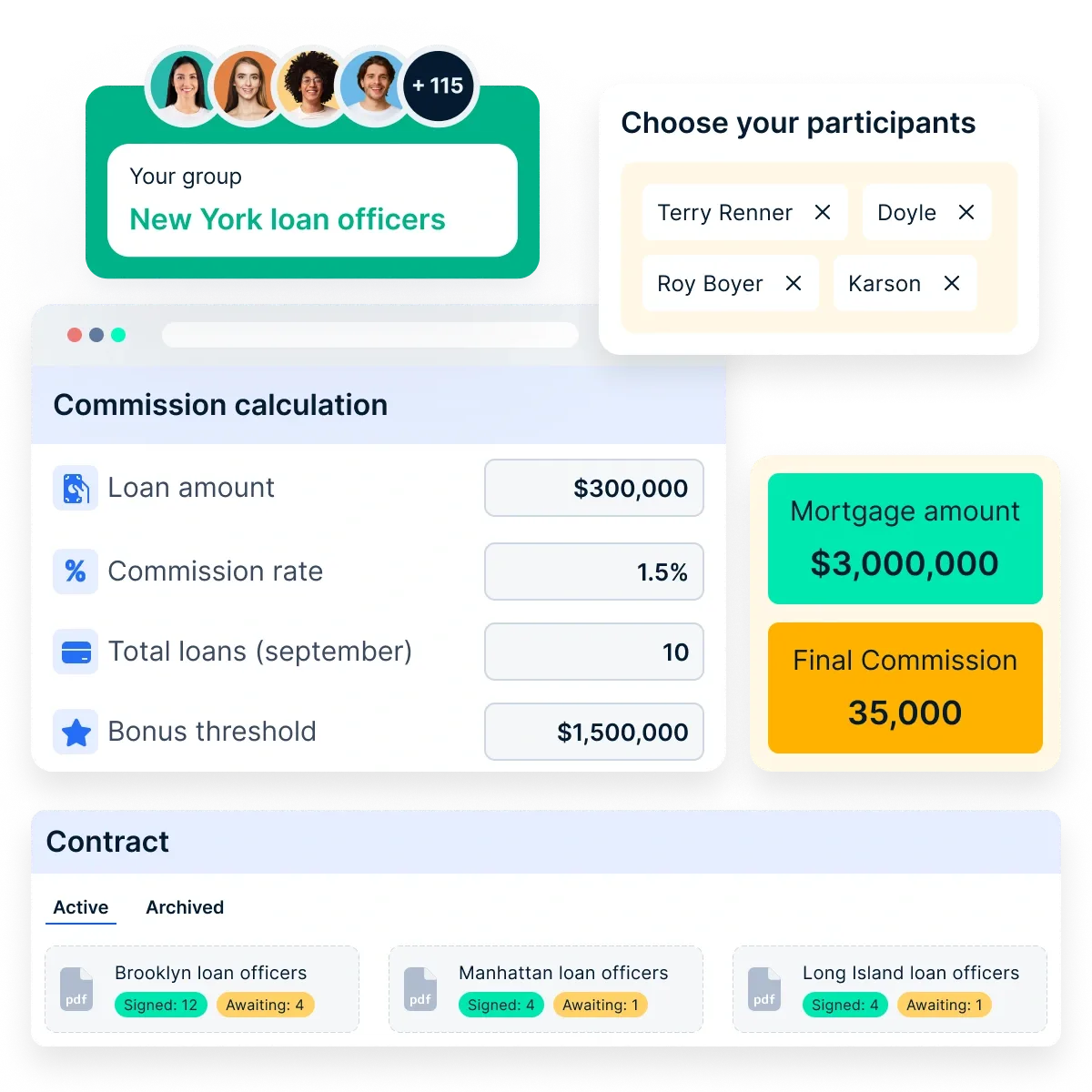
Mempercepatkan jualan dasar dengan automasi komisen
Ejen insurans yang bermotivasi dan diberi insentif adalah berprestasi yang lebih baik. Insuranskan terhadap produktiviti jualan yang rendah dengan Xododay Compass . Platform komisen automatik kini boleh mengurus dan menjejaki program komisen dan KPI pasukan dengan mudah. Nak tahu macam mana? Berbincang dengan pakar komisen kami .
Apakah faktor yang mempengaruhi pendapatan ejen insurans?
Struktur komisen memainkan peranan utama dalam cara ejen insurans memperoleh pendapatan, tetapi faktor lain juga mempengaruhi pendapatan mereka. Ini termasuk:
1. Jenis ejen
Terdapat dua jenis ejen insurans:
- Ejen tawanan menjual polisi untuk satu pembekal insurans.
- Ejen bebas bekerja dengan berbilang pembawa insurans.
Ejen bebas biasanya memperoleh komisen yang lebih tinggi, tetapi mereka juga menanggung perbelanjaan perniagaan mereka sendiri, seperti sewa, bekalan pejabat dan pemasaran.
2. Jenis polisi
Ejen insurans boleh pakar dalam satu atau beberapa jenis polisi. Sebagai contoh, ejen insurans rumah mungkin juga menjual insurans kereta. Ejen insurans hayat boleh berkembang menjadi insurans kesihatan. Untuk berbuat demikian, mereka mesti memenuhi keperluan pelesenan dalam bidang kuasa mereka.
3. Lokasi
Tempat ejen beroperasi mempengaruhi potensi pendapatan mereka. Bandar besar dengan populasi yang tinggi menawarkan lebih banyak peluang jualan daripada bandar kecil. Faktor berasaskan lokasi lain termasuk:
- Akses kepada perkhidmatan awam
- Kos sara hidup
- Kadar pekerjaan
- Kadar keselamatan dan kemalangan awam
Unsur-unsur ini membentuk permintaan pasaran dan mempengaruhi jumlah pendapatan ejen insurans.
Berapakah pendapatan ejen insurans?
Gaji ejen insurans berbeza-beza. Biro Statistik Buruh (BLS) melaporkan purata gaji tahunan $79,650, atau $37 sejam. Jawatan peringkat permulaan biasanya membayar kurang. Ejen berpengalaman dengan asas pelanggan yang kukuh boleh mencapai pendapatan enam angka. Data ini termasuk pelbagai jenis insurans. Ini merangkumi harta benda dan mangsa, nyawa dan kesihatan, antara lain. BLS menganggarkan 455,540 pekerjaan ejen insurans.
Jadual berikut menunjukkan peratusan gaji terperinci untuk ejen insurans. Ini berdasarkan Statistik Pekerjaan Pekerjaan dan Gaji (OEWS) BLS terkini. Ia menawarkan cerapan tentang potensi pendapatan pada tahap yang berbeza.
Persentil | Gaji Tahunan |
ke-10 | $38,210 |
ke-25 | $51,200 |
ke-50 (Median) | $65,580 |
ke-75 | $99,840 |
ke-90 | $128,660 |
Cabaran biasa yang dihadapi oleh ketua jualan dalam menguruskan komisen ejen insurans – dan bagaimana Compass menyelesaikan mereka
Pemimpin jualan dalam industri insurans menghadapi beberapa halangan apabila menguruskan komisen ejen. Dengan pelbagai jenis dasar, struktur pembayaran yang kompleks, dan gabungan ejen langsung, broker dan agensi bebas, memastikan ketepatan dan motivasi menjadi tugas yang sukar.
Ralat dalam pembayaran komisen, pertikaian mengenai potongan dan kekurangan alat penglibatan boleh membawa kepada pergolakan ejen yang tinggi dan kehilangan peluang hasil. Compass memudahkan pengurusan komisen dengan mengautomasikan pembayaran, meningkatkan ketelusan dan memperkenalkan gamifikasi untuk meningkatkan prestasi jualan.
Ini Compass menangani cabaran utama:
1. Ketidaktepatan data dan pertikaian pembayaran
Penjejakan komisen secara manual menggunakan hamparan selalunya mengakibatkan kesilapan pengiraan, pembayaran yang salah dan atribusi yang tidak konsisten merentas saluran jualan yang berbeza. Ejen yang menerima komisen yang salah mungkin kehilangan kepercayaan terhadap sistem, yang membawa kepada peningkatan dalam pertikaian dan penurunan motivasi. Menyelesaikan pertikaian ini boleh memakan masa untuk ketua jualan, mengalihkan perhatian daripada aktiviti jualan teras.
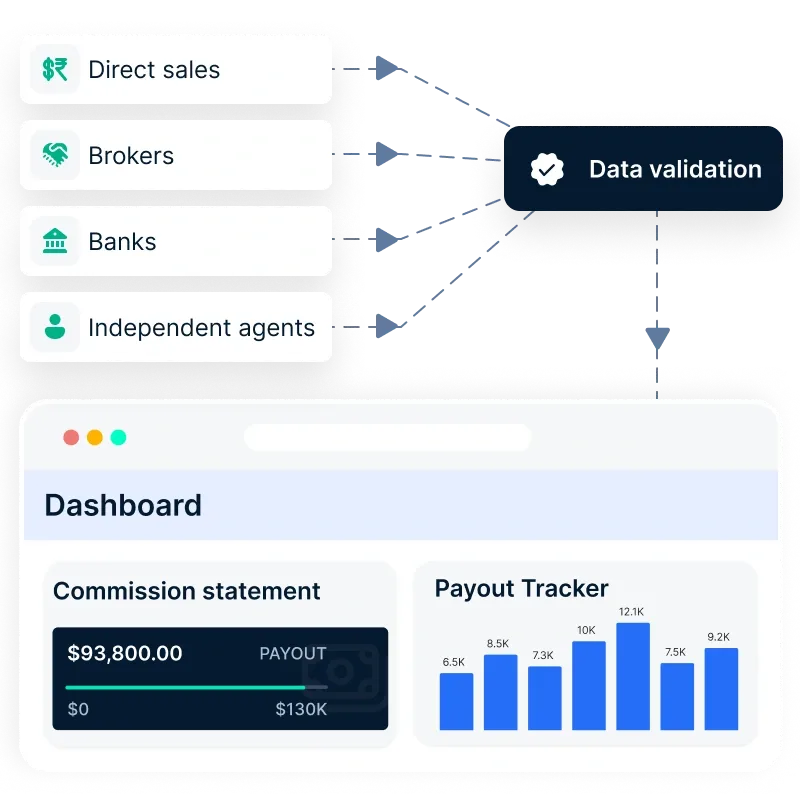
Penyelesaian Compass : Compass menghapuskan keperluan untuk hamparan dengan memusatkan penjejakan komisen pada satu papan pemuka. Pengiraan automatik memastikan setiap jualan polisi dikaitkan dengan tepat, mengurangkan ralat pembayaran. Ejen menerima kemas kini masa nyata tentang pendapatan mereka, mengurangkan pertikaian dan memupuk kepercayaan dalam struktur komisen.
2. Menguruskan caj balik dan caj balik
Salah satu aspek pengurusan komisen yang paling mencabar ialah clawbacks—mendapatkan semula komisen yang dibayar untuk polisi yang dibatalkan atau didapati salah nyata. Mengendalikan ini secara manual boleh menjadi tidak cekap dan terdedah kepada ralat, yang membawa kepada lebihan pembayaran atau hubungan yang tegang dengan ejen. Dasar clawback yang tidak jelas boleh menyebabkan pertikaian dan menghalang ejen daripada menjual polisi bernilai tinggi.
Penyelesaian Compass : Compass mengautomasikan peruntukan clawback, memastikan bahawa potongan untuk polisi yang dibatalkan, pelanggaran kontrak atau salah nyata diproses dengan lancar. Sistem ini menyediakan dokumentasi yang jelas dan masa nyata bagi pengiraan clawback, memastikan ejen memahami potongan dan meminimumkan konflik.
3. Kekurangan keterlihatan ke dalam struktur komisen
Kekecewaan biasa di kalangan ejen insurans ialah kekurangan kejelasan tentang cara pengiraan komisen mereka. Tanpa keterlihatan ke dalam struktur komisen, ejen mungkin berasa hilang semangat atau ragu-ragu tentang pembayaran mereka. Ketua jualan sering bergelut untuk menyampaikan kemas kini atau perubahan dalam struktur komisen dengan berkesan, yang membawa kepada salah faham dan pemutusan hubungan.
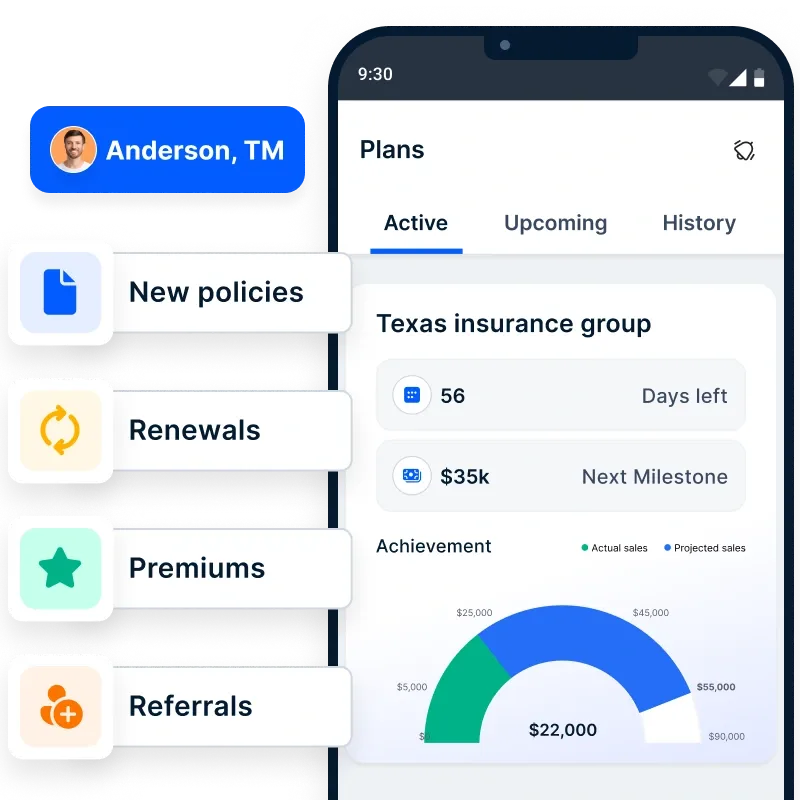
Penyelesaian Compass : Compass menyediakan sistem pengurusan komisen yang telus di mana ejen boleh mengakses pecahan masa nyata pendapatan mereka. Melalui papan pemuka mesra mudah alih, ejen boleh menjejak prestasi mereka, melihat pengiraan pembayaran dan memuat turun dokumen struktur insentif. Tahap ketelusan ini membantu ejen kekal bermotivasi dan mengurangkan pertanyaan tentang pendapatan.
4. Memotivasi ejen untuk menjual polisi hasil tinggi
Banyak ejen insurans memberi tumpuan kepada polisi yang mudah dijual dan bernilai rendah, yang mungkin tidak menyumbang dengan ketara kepada hasil syarikat. Tanpa insentif berasaskan hasil yang jelas, ejen mungkin tidak mempunyai motivasi untuk mengutamakan dasar yang menghasilkan keuntungan yang lebih tinggi untuk syarikat. Ini mengakibatkan prestasi jualan yang tidak optimum dan terlepas peluang pertumbuhan.
Penyelesaian Compass : Compass membolehkan ketua jualan melaksanakan KPI terdorong hasil berstruktur yang menyelaraskan komisen dengan dasar hasil tinggi. Dengan menawarkan insentif yang lebih tinggi untuk dasar yang menjana lebih banyak nilai perniagaan, Compass memastikan ejen bermotivasi untuk mengutamakan jualan ini. Sistem automatik mengemas kini unjuran pendapatan secara dinamik, menunjukkan ejen faedah kewangan langsung daripada menjual polisi yang lebih menguntungkan.
5. Memastikan ejen terlibat dan mengurangkan churn
Tanpa penglibatan berterusan, ejen mungkin kehilangan minat atau mencari peluang dengan pesaing yang menawarkan insentif yang lebih menarik. Struktur komisen tradisional sering kekurangan elemen interaktif yang memastikan ejen bermotivasi. Ketua jualan bergelut untuk mengekalkan tahap penglibatan yang tinggi, yang membawa kepada produktiviti yang lebih rendah dan perolehan yang lebih tinggi.
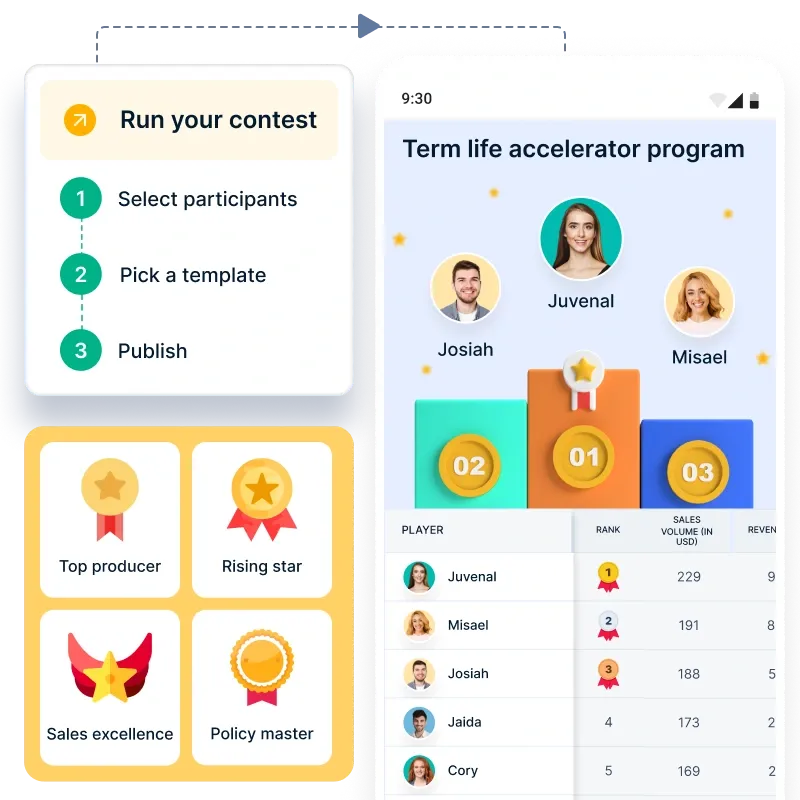
Penyelesaian Compass : Compass memperkenalkan gamifikasi kepada proses jualan, menjadikan jualan berasaskan komisen menjadi pengalaman yang dinamik dan menarik. Peraduan jualan, papan pendahulu langsung dan kad skor prestasi memberi insentif kepada ejen untuk menolak had mereka. Syarikat boleh mencipta pertandingan tersuai merentas jenis dasar yang berbeza, memberi ganjaran kepada mereka yang berprestasi tinggi dengan bonus, pengiktirafan dan peluang pertumbuhan kerjaya. Pendekatan ini bukan sahaja meningkatkan prestasi jualan tetapi juga mengukuhkan kesetiaan ejen.
Untuk meringkaskan
Mengetahui tentang ekonomi komisen ejen insurans menyerlahkan hubungan penting antara sistem insentif yang mengawal gaji mereka dan bagaimana ia memotivasi ejen.
Memandangkan gaji komisen menjadi faktor motivasi ejen, adalah penting bagi syarikat insurans untuk mengendalikan gaji ejen mereka dengan berkesan.
Di sinilah perisian pampasan jualan - Compass muncul sebagai alat penting.
Penyelesaian komprehensif yang memperkemas dan menguruskan kerumitan struktur komisen.
Membolehkan penanggung insurans untuk:
- mengira dengan berkesan,
- trek, dan
- mengeluarkan komisen kepada ejen mereka
Jika anda ingin tahu lebih lanjut, bagaimana sebenarnya Compass boleh mengautomasikan pembayaran komisen ejen insurans anda kemudian tempah demo sekarang!
Soalan lazim
1. Apakah komisen untuk ejen insurans?
Komisen untuk ejen insurans berbeza mengikut jenis polisi, syarikat insurans dan wilayah. Biasanya, komisen insurans hayat berkisar antara 30% hingga 90% daripada premium tahun pertama, manakala komisen insurans kesihatan dan harta adalah sekitar 5% hingga 20% bagi setiap polisi.
2. Apakah komisen terbaik untuk ejen insurans?
Komisen terbaik bergantung kepada jenis polisi. Insurans hayat menawarkan komisen tertinggi (sehingga 90% pada tahun pertama), tetapi komisen pembaharuan menurun dengan ketara. Insurans harta dan kemalangan memberikan komisen permulaan yang lebih rendah tetapi menawarkan pembaharuan yang berterusan.
3. Adakah jurujual insurans memperoleh pendapatan yang lumayan?
Ya, ejen insurans yang berjaya boleh memperoleh pendapatan yang lumayan, terutamanya mereka yang menjual polisi komisen tinggi (cth, insurans hayat) dan mengekalkan pelanggan untuk komisen pembaharuan. Pendapatan berbeza-beza berdasarkan pengalaman, kemahiran jualan dan syarikat insurans.
4. Apakah nisbah komisen yang baik dalam insurans?
Nisbah komisen yang baik mengimbangi komisen pendahuluan dan pembaharuan. Julat yang sihat ialah 40-70% untuk insurans hayat tahun pertama dan 10-15% untuk pembaharuan, manakala komisen insurans harta biasanya berkisar antara 10-20% dengan pembaharuan pada 5-10%.










